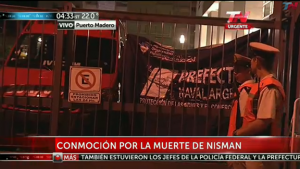Argentinean prosecutor Alberto Nisman, in charge of the investigation into the 1994 bombing of a Jewish community center in Buenos Aires, was found dead late on Sunday, 18 January. Police came across his body in the bathroom of his house in the capital’s exclusive Puerto Madero neighborhood, just hours before he was due to give evidence before Congress.

On Tuesday, January 13, the prosecutor charged Argentinean President Cristina Kirchner and Foreign Minister Héctor Timerman, among others, with “negotiating a plan of impunity and covering up for the criminal Iranians accused of the blast at the Jewish center.” In a 300-page document, Nisman suggested that Kirchner had brokered a 2012 back-channel deal with Tehran to protect those responsible, in exchange for a preferential trade deal.
At around 3:30 a.m. Buenos Aires time, investigating Judge Viviana Fein confirmed the news already circulating informally on social media: “We’re investigating the causes of death, which will be brought to light in the next few days.”
A few hours later, a statement from the Security Ministry issued further details: “Federal Police officers guarding Nisman alerted the authorities late on Sunday over his failure to answer their insistent telephone calls.”
According to the official briefing, “as the man was not responding to the doorbell either, and finding the Sunday newspaper still in the hall, they decided to notify his relatives,” and contacted Nisman’s mother.
After finding a locksmith to open the door of Nisman’s residence, which they had found “with the key stuck in the lock from the inside,” officers found “the body of Nisman inside his en-suite bathroom, blocking the door.”
Patricia Bullrich, a deputy with the Unión por Todos (Union for Everyone) Party, told news channel Todo Noticias that Nisman “was being severely threatened.… I spoke with him on Saturday to coordinate his arrival to Congress, and he told me that he was being threatened.”
In November 2013, Nisman received threats via email demanding that he “abandon [his] case, and stop investigating the authors of the AMIA attack within 24 hours, or your daughters will suffer grave consequences.”
The charges brought by Nisman had also provoked criticism from the government. Foreign Minister Timerman argued that the allegations were part of a “media show” and accused the prosecutor of lying. “On Monday we’re going to pull out all the stops against Nisman. We’re going to raise the curtain on his lies,” said Deputy Diana Conti, in reference to the planned meeting in Congress.
Nisman was due to appear on Monday before the Penal Legislation Committee of the Chamber of Deputies to answer legislators’ questions over the alleged cover-up for those accused of the attack against the Argentine Israelite Jewish Association (AMIA).
“Those who want a meeting with Nisman, even if it’s open and public, what they really want is to silence the investigator,” argued opposition Deputy Margarita Stolbizer. The audience was due to take place behind close doors, although government officials had previously claimed that it would be public and open to the media.
On July 18, 1994, a car bomb exploded outside the headquarters of the Jewish association, leaving 85 dead and over 300 injured. The judge originally in charge of the investigation, Juan Jose Galeano, was removed from the case in August 2005, having been accused of bribing witnesses, manipulating and destroying evidence, and abandoning lines of investigation without due cause.
In November 2006, Nisman accused the Iranian government — including former President Ali Akbar Hashemi Rafsanjani — of being behind the planning and execution of the terrorist attack, in collaboration with the Lebanese terrorist group Hezbollah. As a result, Interpol gave orders for the arrest of five former Iranian officials singled out as responsible.
Génesis Méndez contributed to this article. Translated by Laurie Blair.
 Versión Español
Versión Español












